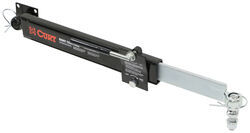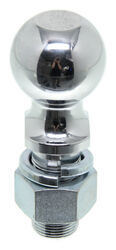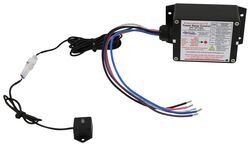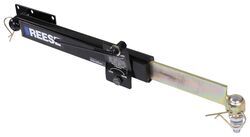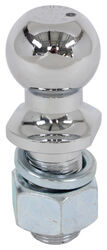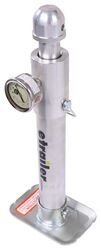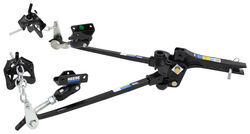
Weight Distribution & Sway Control for 18-Foot Travel Trailer Towed by 2017 Jeep Grand Cherokee
Question:
We have a 2017 Jeep Grand Cherokee trailhawk v6. Its rated to tow 6,200lbs. We have a travel trailer camper that is 18ft not including the hitch. And 3,500lbs dry. We do have a weight distribution hitch is this the same as sway bars?. Im not so much concerned about the weight as we wanted a camper that was approximately half of what its rated at. We got the vehicle first and wanted a smaller camper but not a pop-up. Im more concerned about the length and worried about sway. We live on pretty flat land and have never taken it on the interstate. We stick more to highway. Our wheelbase on the Jeep is 114.5inch and again the camper without the hitch is 18ft. Is this a safe setup? Should I have gone with the 16ft camper?
asked by: Jenna
Expert Reply:
Trailer sway can be reduced or mostly prevented by several types of product. Basic friction-type anti-sway bars like # 17200 and # 83660 provide adjustable resistance to the trailer's swaying motion. They can help but they do not work as well as the integrated sway prevention built into products like the Reese Strait-Line # RP66083 that you referenced. There are even electronic system like # 335TSC-1000 that try to use the trailer brakes to control sway. I recommend a mechanical system like the Reese because it will both balance weight on the GC's two axles and prevent trailer sway.
Better weight distribution systems like the Strait-Line do a superior job with controlling sway and they also allow you to back up the trailer which is not possible with friction bars; they must be disengaged or removed in order to back up the trailer or they will be damaged.
Use of a weight distribution/sway control hitch (WD/SC) is considered mandatory if the loaded trailer's weight is more than half of the vehicle curb weight. Your GC's curb weight is about 4800-lbs so a trailer that is 3500-lbs dry will definitely benefit from a WD/SC system.
Choosing a WD/SC system requires just knowing the fully-loaded tongue weight (TW) of the towing set-up. This is the sum of the loaded trailer TW (you can use scale # e99044 to measure easily and accurately) and the weight of any cargo that sits behind the tow vehicle's rear axle, such as a portable generator or a cooler loaded with food. This total TW should fall in the middle of the system's operating range. Strait-Line # RP66083 works for TW from 400- to 800-lbs. If your loaded trailer weighs 4500-lbs its TW will be around 650 to 675-lbs and this Reese setup is perfect. All you need to add is the correct size hitch ball, either 2-inch ball # A-90 or 2-5/16-inch ball # 19286.

Products Referenced in This Question
Curt Friction Sway Control for Weight Distribution Systems
- Accessories and Parts
- Weight Distribution Hitch
- Sway Control Parts
- CURT
more information >
2-5/16" Hitch Ball - 1-1/4" Diameter x 2-3/4" Long Shank - Chrome - 12,000 lbs
- Trailer Hitch Ball
- Trailer Hitch Ball
- Standard Ball
- Chrome-Plated Steel
- 2-5/16 Inch Diameter Ball
- 2-3/4 Inch Shank Length
- 1-1/4 Inch Diameter Shank
- 12000 lbs GTW
- Class IV
- Class V
- Draw-Tite
more information >
Tuson Asymmetric Sway Control - 1 to 4 Axles
- Weight Distribution Hitch
- Sway Control Only
- Severe Sway
- Tuson RV Brakes
more information >
Reese Friction Sway Control Kit - Economy - by Draw-Tite, Reese and Hidden Hitch
- Accessories and Parts
- Weight Distribution Hitch
- Sway Control Parts
- Reese
more information >
2" Hitch Ball - 1-1/4" Diameter x 2-5/8" Long Shank - Chrome - 10,000
- Trailer Hitch Ball
- Trailer Hitch Ball
- Standard Ball
- Chrome-Plated Steel
- 2 Inch Diameter Ball
- 2-5/8 Inch Shank Length
- 1-1/4 Inch Diameter Shank
- 10000 lbs GTW
- Class IV
- Class V
- CURT
more information >
etrailer Tongue Weight Scale for Campers and Utility Trailers - 2,000-lb Capacity
- Tongue Weight Scale
- Analog Scale
- 2000 lbs
- etrailer
more information >
Product Page this Question was Asked From
Strait-Line Weight Distribution System w/ Sway Control - Trunnion Bar - 8,000 lbs GTW, 800 lbs TW
- Weight Distribution Hitch
- WD With Sway Control
- Some Sway
- Includes Shank
- Electric Brake Compatible
- Fits 2 Inch Hitch
- Allows Backing Up
- 500 lbs
- 600 lbs
- 700 lbs
- Reese
more information >
Featured Help Information
Instructions
Miscellaneous Media

Continue Researching
- Article: 5 Things to Know About Weight Distribution Hitches
- Article: 2 Steps for Finding the Right Weight Distribution Hitch Size
- Article: Which Sway Control Hitch is Right For Your Trailer?
- Q&A: Comparing B&W Continuum And Reese Strait-Line Weight Distribution Systems
- Article: 5 Tips to Confidently Choose Your Weight Distribution Hitch
- Q&A: Comparing Weight Distribution Systems that Use Chains Versus No Chains
- Article: Determining Trailer Tongue Weight
- Q&A: Does Torklift 36 inch Hitch Extension for Ford 3 inch Hitch Have Capacity for 6,700 lb Trailer
- Article: How to Measure for Trailer Hitch Drop
- Article: How to Install a Weight Distribution Hitch (With Pictures & Video)
- Q&A: Troubleshooting External Sensor Error on Lippert Leveling System
- Q&A: Weight Distribution Recommendation for 2022 Honda Ridgeline Towing Trailer with 450 lb Tongue Weight
- Q&A: Weight Distribution Recommendation for 2021 Jayco SLX 8 224 BH
- Q&A: Which Blue Ox Weight Weight Distribution System for Lance 1475 Trailer



